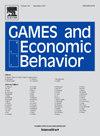The limits of identification in discrete choice
IF 1
3区 经济学
Q3 ECONOMICS
引用次数: 0
Abstract
This paper uncovers tight bounds on the number of preferences permissible in identified random utility models. We show that as the number of alternatives in a discrete choice model becomes large, the fraction of preferences admissible in an identified model rapidly tends to zero. We propose a novel sufficient condition ensuring identification, which is strictly weaker than some of those existing in the literature. While this sufficient condition reaches our upper bound, an example demonstrates that this condition is not necessary for identification. Using our new condition, we show that the classic “Latin Square” example from social choice theory is identified from stochastic choice data.
离散选择中辨识的极限
本文揭示了在确定的随机实用新型中允许的偏好数量的严格界限。我们表明,随着离散选择模型中选择的数量变大,在已识别模型中可接受的偏好的比例迅速趋于零。我们提出了一个新的充分条件,以确保识别,这是严格弱于一些现有的文献。当这个充分条件达到我们的上界时,一个例子证明这个条件对于识别是不必要的。利用我们的新条件,我们证明了社会选择理论中的经典“拉丁方块”例子是从随机选择数据中识别出来的。
本文章由计算机程序翻译,如有差异,请以英文原文为准。
求助全文
约1分钟内获得全文
求助全文
来源期刊

Games and Economic Behavior
ECONOMICS-
CiteScore
1.90
自引率
9.10%
发文量
148
期刊介绍:
Games and Economic Behavior facilitates cross-fertilization between theories and applications of game theoretic reasoning. It consistently attracts the best quality and most creative papers in interdisciplinary studies within the social, biological, and mathematical sciences. Most readers recognize it as the leading journal in game theory. Research Areas Include: • Game theory • Economics • Political science • Biology • Computer science • Mathematics • Psychology
 求助内容:
求助内容: 应助结果提醒方式:
应助结果提醒方式:


